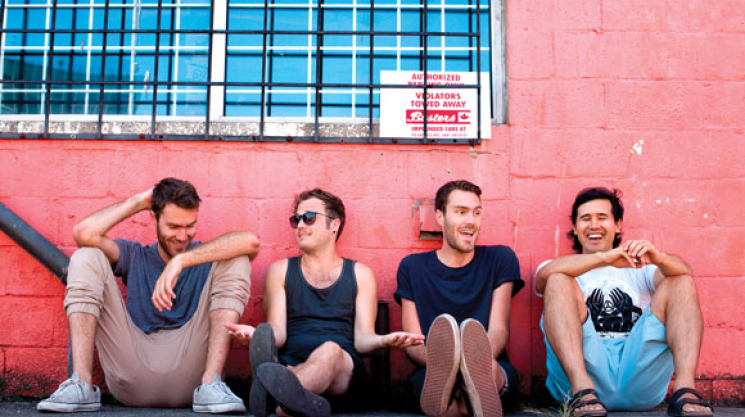
Wed, 09/25/2013 - 22:49 by Natasha Neale
The star is most definitely on the rise for West Coast band Bear Mountain, whether they have time to sit back, bask, and properly acknowledge it or not. And with all the hard work they put into their music, visuals, production and tours, it’s not only easy to see why they are receiving such deserved acclaim, but also assuring to see such innovation and dedication rewarded. I mean, they have a creative director who turns their music into images in real time on stage. What’s not to love! We asked Grady Mitchell to speak to and photograph Bear Mountain on behalf of ION.
“Well, there was one moment,” says Greg Bevis, drummer for Vancouver's Bear Mountain, the dance-pop band he shares with his twin brother, Ian, guitarist Kyle Statham, and creative director Kenji Rodriguez. There was a minute or two among the triumphant reviews, sprawling tours, label negotiations, and huge festival crowds when he had time to appreciate the surrealism of their meteoric rise. He was sitting in a hotel room in New York, paid for by Atlantic Records. He'd just arrived there on a flight covered by the same company, so it probably goes without saying they were extremely interested in the young West Coast band. "This is too much," Greg remembers thinking. "I almost had to leave." Thankfully, he stuck around.
The boys found themselves there because of XO, the EP they self-released in August 2012. It's a sparkling, spiraling collection of joyful dance pop that seamlessly interweaves live instruments with electronic elements. Astral beats lay the foundation upon which Kyle's guitar, Greg's drums and Ian's soul singer rasp build each celebratory song, peppered with the occasional fun side note, like sampled dialogue from Gone With The Wind. Their unique sound is an attempt to strike the perfect balance between acoustic elements and electronic ones, to find harmony between raw, emotive analog and sleekly flawless technology.
Although listeners rejoice, the band feels they haven't found that ideal middle ground yet. Like an ever-receding horizon, it slips farther away the closer they get. But that pursuit is also the point. "I know there's a sound, a vibe, a hybrid we can get to," Ian says. "There are a lot of songs we haven't written yet, a lot of sounds we haven't explored."
In the meantime, their sonic wanderings have uncovered gold. XO's second track, “Congo”, made number five on the Hype Machine chart. Not long after, their song “Two Step” reached number one. Those are very modern achievements for a very modern band, indicative of a fact they readily acknowledge: Bear Mountain is a product of its generation. "Everything's happening at once right now," says Greg. "You can listen to records from any time, and it's all current because it's all new to you. You can't really ask that question anymore: 'what do you listen to?' Everybody listens to everything."
Likewise, Bear Mountain pulls influence from myriad sources, including obvious comparisons like Hot Chip and Cut Copy, throwbacks like Pink Floyd, and esoteric sub-genres like moombahton, which blends lightning paced techno with traditional Mexican music. Much of the band's success is based on that inventive mash up style. But it's also founded on their behind the scenes hustle.
In their own studio they tracked and produced songs from first note to last. They bombarded social media, sent songs to hundreds of blogs, cut remixes to catch attention, perfected their live show, and brought onboard Kenji to hone a visual identity worthy of their sonic one.
Lots of bands have a person in charge of visuals. Few list that person in their roster: fewer still bring them onstage. Kenji is Bear Mountain's creative director, and although his role seems unusual, it's quickly apparent how essential he is. As an employee of a Vancouver visual effects company, he's helped develop the interactive stage shows of Arcade Fire and Purity Ring. When it comes to his own band, he's created a comprehensive visual language as singular as their sonic one: the phased together images of oceans, mountains, and glaciers in spectacular galactic colours that appear as album art, promo posters, and in the video for “Two Step”, as well as the polygonal heads the guys often wear in photos, with each member's shape specifically assigned to them for reasons Kenji keeps secret.
He also orchestrates how their live performances look. There's a reason he's onstage: he's playing as hard as any of his band mates. By hitting notes on his keytar, Kenji triggers a series of projections that are then mapped onto 3D shapes onstage, meaning no two Bear Mountain shows look exactly alike. Soon he hopes to link each member's instrument into the visual system, allowing audiences to see the music they make in real time.
That utter absorption in their work, not only in the music but also the million details around it, is what enabled Bear Mountain, as a yet-unsigned band, to book tours and festival spots. Ultimately, it brought them to that room in New York and an offer from Atlantic. An offer they politely declined.
If that seems insane to you, well, it did to them, too. They had a wish list of gear to buy and two weeks' notice ready to hand in. But, and here they're quick to compliment Atlantic, it just didn't feel right. One night, over a post-practice beer at Vancouver tap house Alibi Room, they discussed the negotiations, which were then months deep.
"Everybody said yes, we're ready for this," recalls Kenji. "And then suddenly, it's like..."
"We're not ready for this," finishes Ian. A gut decision, maybe, but hardly an easy one: "Saying no to Atlantic was really fucking scary."
As they left the bar, their waitress chased them down, waving a piece of paper. "She's like, 'You forgot your record deal,'" says Kyle, laughing.
Aware the stakes were now higher than ever, they doubled their effort and reaffirmed their trust in the music they were making. Rightly so. It brought them to Last Gang, a Canadian label where they feel at home. With more tours upcoming and an album on the horizon, they've continued searching for that perfect vibe. And when they find it, what will it sound like?
"That feeling of, yes! Conquering life," says Ian. "That elevated, 'holy shit this is incredible' thing. I think that's what life is; a search for those beautiful, single moments. When we write songs, that's what we're after."
"Because so much of life is not that, it's the search for that," adds Greg.
Ian reflects a moment, and then continues. "But when you find it, it's so good. That's universal. Everyone is after that same thing. I think, in essence, it's love."
"You can listen to records from any time, and it's all current because it's all new to you. You can't really ask that question anymore: 'what do you listen to?' Everybody listens to everything."




Add comment